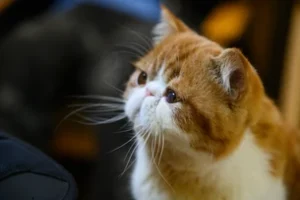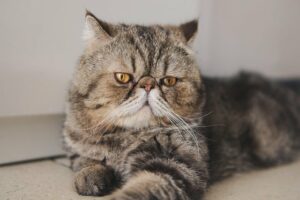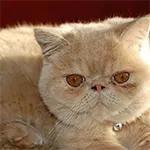The Exotic Shorthair is often referred to as the “lazy person’s Persian” due to its resemblance to the Persian cat but with a short, easy-to-care-for coat. Known for their plush, teddy bear-like appearance and sweet, affectionate nature, Exotic Shorthairs are a popular choice for those who love the look of the Persian but prefer a cat with lower grooming needs. This guide will provide you with everything you need to know about this charming breed, from their history and personality to grooming and health care.
History of the Exotic Shorthair
Origins and Development
The Exotic Shorthair is a relatively new breed, developed in the mid-20th century. Breeders wanted to create a cat with the look of a Persian but with a short coat that required less maintenance. To achieve this, they crossed Persians with American Shorthairs and other short-haired breeds like the Burmese and Russian Blue. The result was a cat that had the same round face, short nose, and large eyes as the Persian but with a dense, plush coat that was much easier to care for.
The breed was officially recognized by cat associations in the 1960s and has since become one of the most popular cat breeds in the world, beloved for its adorable appearance and affectionate personality.
The Persian Connection
Exotic Shorthairs share a close lineage with Persian cats, and as a result, they have many of the same physical traits, including their round faces, large eyes, and short noses. The primary difference between the two breeds is the coat length. While Persians have a long, flowing coat that requires daily grooming, Exotic Shorthairs have a short, dense coat that is much easier to manage.
Physical Characteristics


Appearance and Size
Exotic Shorthairs are medium to large-sized cats with a sturdy, muscular build. They typically weigh between 8 to 15 pounds, with males being slightly larger than females. They have a round face with full cheeks, large, round eyes, and a short, flat nose, giving them a sweet, almost teddy bear-like appearance. Their small, rounded ears fit closely to their head, enhancing their overall roundness.
Coat and Colors
The Exotic Shorthair’s coat is one of its most distinctive features. It is short, dense, and plush, with a soft, luxurious feel. The breed comes in nearly all the colors and patterns found in Persians, including solid, bicolor, tabby, calico, and more. The coat has a slight “stand-off” quality, meaning it doesn’t lie flat against their body but rather stands away slightly, adding to their plush appearance.
Personality and Temperament
Affectionate and Loyal
Exotic Shorthairs are known for their affectionate and loyal nature. They form strong bonds with their human families and enjoy spending time with their owners. While they are not as demanding as some other breeds, they appreciate attention and love to be petted and cuddled. Their gentle, calm demeanor makes them an excellent choice for families with children or other pets.
Playful and Curious
Despite their relaxed nature, Exotic Shorthairs are playful and curious cats. They enjoy interactive toys and games and often retain their kitten-like playfulness well into adulthood. However, they are not as hyperactive as some other breeds, preferring to engage in bursts of play followed by long naps.
Social and Adaptable
Exotic Shorthairs are social cats that generally get along well with other pets, including dogs. They are adaptable and can thrive in various living environments, whether it’s a bustling family home or a quieter single-person household. Their easygoing nature makes them a good fit for almost any type of owner.
Grooming and Maintenance
Coat Care
One of the biggest advantages of the Exotic Shorthair over its Persian cousin is its low-maintenance coat. The short, dense fur requires only weekly brushing to remove loose hairs and keep it looking its best. This is much easier than the daily grooming required by Persians to prevent matting and tangles. However, during shedding seasons, more frequent brushing may be necessary to manage the extra fur.
Facial Care
Due to their flat faces, Exotic Shorthairs can be prone to tearing and eye discharge, which can stain the fur around their eyes. It’s important to clean their faces regularly with a damp cloth to prevent staining and keep them comfortable. Using a vet-recommended eye cleaner can also help reduce tear staining.
Dental and Nail Care
Like all cats, Exotic Shorthairs benefit from regular dental care. Brushing their teeth several times a week with a cat-specific toothpaste can help prevent dental diseases. Additionally, their nails should be trimmed every few weeks to prevent overgrowth and to keep them from becoming too sharp. Providing scratching posts around your home can also help them maintain healthy nails naturally.
Diet and Nutrition
Nutritional Requirements
Exotic Shorthairs have moderate energy levels, so their diet should be balanced to support their activity while preventing obesity. A high-quality cat food that is rich in protein and low in carbohydrates is recommended. Whether you choose to feed them dry kibble, wet food, or a combination of both, make sure the food is specifically formulated for their life stage—kitten, adult, or senior.
Portion Control
Exotic Shorthairs enjoy their food and can be prone to overeating if not carefully monitored. It’s important to provide measured portions based on their age, weight, and activity level. Avoid free-feeding and instead offer meals at specific times each day. Regularly monitor your cat’s weight and consult with your veterinarian to adjust their diet as needed.
Hydration
As with all cats, ensuring that your Exotic Shorthair stays well-hydrated is crucial. Providing fresh water at all times is essential, and some cats may prefer running water from a cat fountain. Wet food can also contribute to their overall hydration, which is important for maintaining healthy kidneys and urinary function.
Health and Lifespan
Common Health Issues
Exotic Shorthairs are generally healthy cats, but they are prone to certain health issues, many of which they share with their Persian relatives. Some of the common conditions seen in this breed include:
- Brachycephalic Syndrome: Due to their flat faces, Exotic Shorthairs can experience breathing difficulties, especially in hot or stressful environments. It’s important to keep them cool and stress-free to minimize these risks.
- Polycystic Kidney Disease (PKD): This genetic condition causes cysts to form in the kidneys, leading to kidney dysfunction over time. Genetic testing can help identify PKD in breeding lines.
- Dental Issues: The breed’s flat face can contribute to dental problems, so regular dental care is essential to prevent tartar buildup and gum disease.
Lifespan
With proper care, Exotic Shorthairs typically live between 12 to 15 years, although some can live longer. Ensuring they have a balanced diet, regular exercise, and routine health checks can help them lead a long, healthy life.
Tips for Living with an Exotic Shorthair
Provide a Comfortable Environment
Exotic Shorthairs appreciate a comfortable and secure environment. They enjoy having cozy spots where they can relax and observe their surroundings. Providing soft bedding, cat trees, and perches where your cat can retreat and feel safe will help them feel at home.
Encourage Play and Exercise
Although Exotic Shorthairs are not as energetic as some other breeds, they still need regular exercise to maintain a healthy weight and stay mentally stimulated. Interactive toys, laser pointers, and gentle play sessions can help keep them engaged. Encouraging your cat to chase toys or explore different parts of your home will also help prevent boredom.
Monitor Health and Weight
Exotic Shorthairs can be prone to weight gain, so it’s important to monitor their diet and exercise regularly. Pay attention to any changes in behavior, appetite, or activity levels, as these can be early signs of health issues. Regular veterinary check-ups are also essential for maintaining your Exotic Shorthair’s overall health.
FAQs about Exotic Shorthair Cats
Are Exotic Shorthairs good with children?
Yes, Exotic Shorthairs are known for their gentle and patient nature, making them excellent companions for families with children. They are tolerant and enjoy being around people, making them well-suited to a busy household.
How much grooming do Exotic Shorthairs require?
Exotic Shorthairs require less grooming than their Persian counterparts, but their dense, plush coat still benefits from weekly brushing. Regular facial cleaning is also important due to their flat faces, which can lead to tear staining.
Do Exotic Shorthairs get along with other pets?
Yes, Exotic Shorthairs generally get along well with other pets, including dogs and other cats. Their easygoing and social nature makes them a good fit for multi-pet households.
What health issues are common in Exotic Shorthairs?
Exotic Shorthairs are prone to certain health issues, including Brachycephalic Syndrome, Polycystic Kidney Disease (PKD), and dental problems due to their flat faces. Regular veterinary check-ups and good home care can help manage these risks.
How long do Exotic Shorthairs live?
With proper care, Exotic Shorthairs typically live between 12 to 15 years, though some can live longer. A balanced diet, regular exercise, and routine health checks are key to ensuring a long, healthy life.












